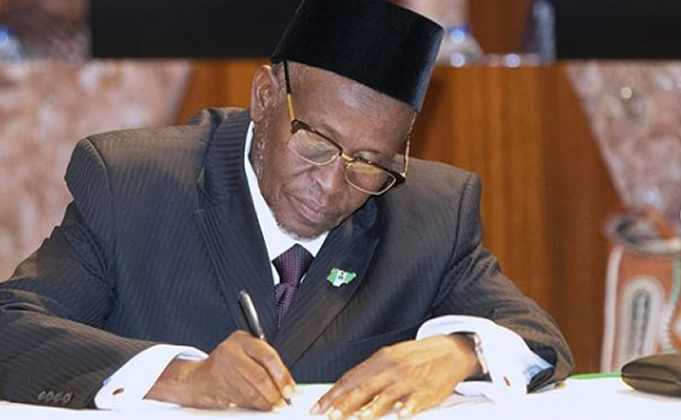Posted on Feb 03, 2020
The number of Justices of the Supreme Court drops from 14 to 13 as Justice Amiru Sanusi retires from the apex court’s bench today (Monday).
This development comes on the heels of repeated complaints by the Chief Justice of Nigeria, Justice Tanko Muhammad, that he and his colleagues on the apex court’s bench are overworked.
The PUNCH reports that the constitution provides for 21 Justices as a full complement of the apex court’s bench, a status the highest court of the land has never attained.
The number of Justices of the Supreme Court reached 17 on January 18, 2019 when the then Chief Justice of Nigeria, Justice Walter Onnoghen (retd), swore in Justice Uwani Abba-Aji to the apex court’s bench.
But starting with the controversial exit of Justice Onnoghen from the bench in April 2019 and the retirement of Justices Kumai Akaahs and Sidi Bage last year, the number of the Supreme Court Justices dropped to 14.
In June 2019, the President, Major General Muhammadu Buhari (retd.), wrote a letter requesting the Chief Justice of Nigeria, Justice Tanko Muhammadu, to “initiate in earnest the process of appointing additional five Justices of the Supreme Court of Nigeria to make the full complement of 21 Justices” as provided by the Constitution.
But the President has yet to act on the list of four Justices of the Court of Appeal recommended by the National Judicial Council and sent to him for appointment to the apex court’s bench since October 2019.
A statement by the NJC’s Director, Information, Mr Soji Oye, had stated that the council, at its meeting held on October 22 and 23, 2019, recommended Justices Adamu Jauro, Emmanuel Agim, C. Oseji, and Helen Ogunwumiju.
While the President was being awaited to forward the names of the nominees to the Senate for confirmation, Justice Akaahs retired from the Supreme Court’s bench on December 12, 2019.
The Supreme Court’s Director of Information, Dr Festus Akande, in a statement on Friday, announced that Justice Amiru Sanusi, who was appointed to the apex court’s bench in May 2015, would retire on attaining the mandatory retirement age of 70 today.
With his retirement, the number of Supreme Court Justices, which is currently 14, will drop to 13, leaving a gap of eight Justices to make the full complement of 21.
When contacted, the apex court’s Director of Information, Akande, said he had no information on the delay in the appointment process of the recommended Justices for the apex court.
But reacting on behalf of the Nigerian Bar Association, the association’s National Publicity Secretary, Mr Kunle Edun, said the delay in the process of appointing four judges recommended by the NJC for the apex court’s bench, had “created unhealthy burden on the Supreme Court Justices who are now forced to overwork themselves.”
Edun added that it was worrying that the Supreme Court had been unable to get its full complement of 21 Justices.
He stated, “It is worrying that the Supreme Court has yet to have its full complement of Justices on the Supreme Court bench. The recent recommendation of the National Judicial Council on the elevation of some Justices of the Court of Appeal to the Supreme Court has yet to be acted upon by the Presidency and the Senate.
“The President is to approve the nominations and present the same to the Senate for confirmation.
“This delay has created an unhealthy burden on the Supreme Court Justices who are now forced to overwork themselves. In many cases, appeals stay in the Supreme Court for 10 years before one can get a hearing date.
“This should not be the case. When justice is delayed it could propel litigants to resort to other options to settle scores, which would not help the society.
“The Nigerian Bar Association, therefore, urges the Federal Government and all parties involved to consider the recommendations of the NJC quickly. It’s been about five months now and still nothing done.”
